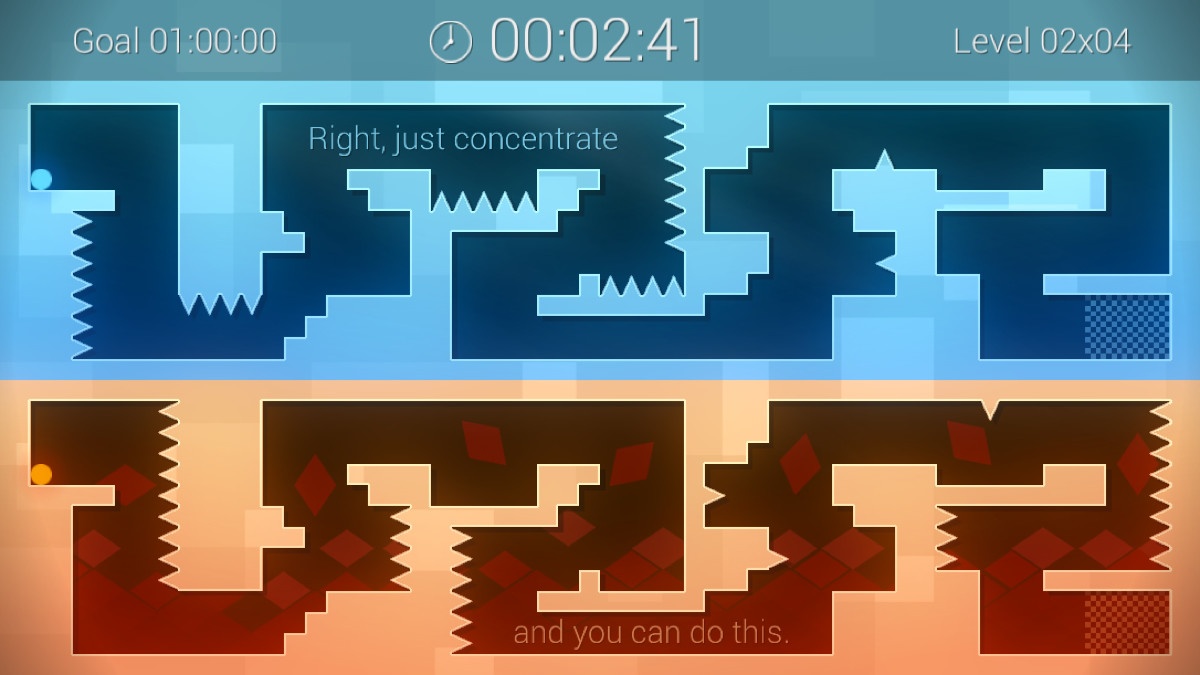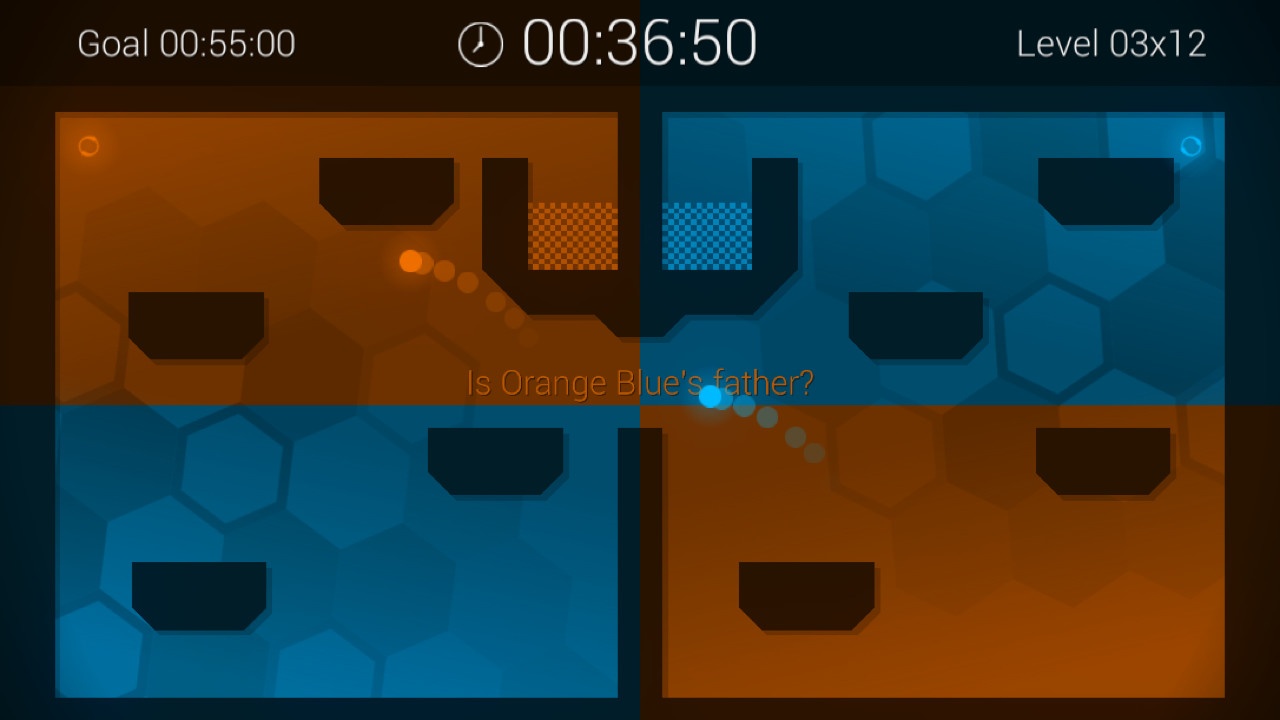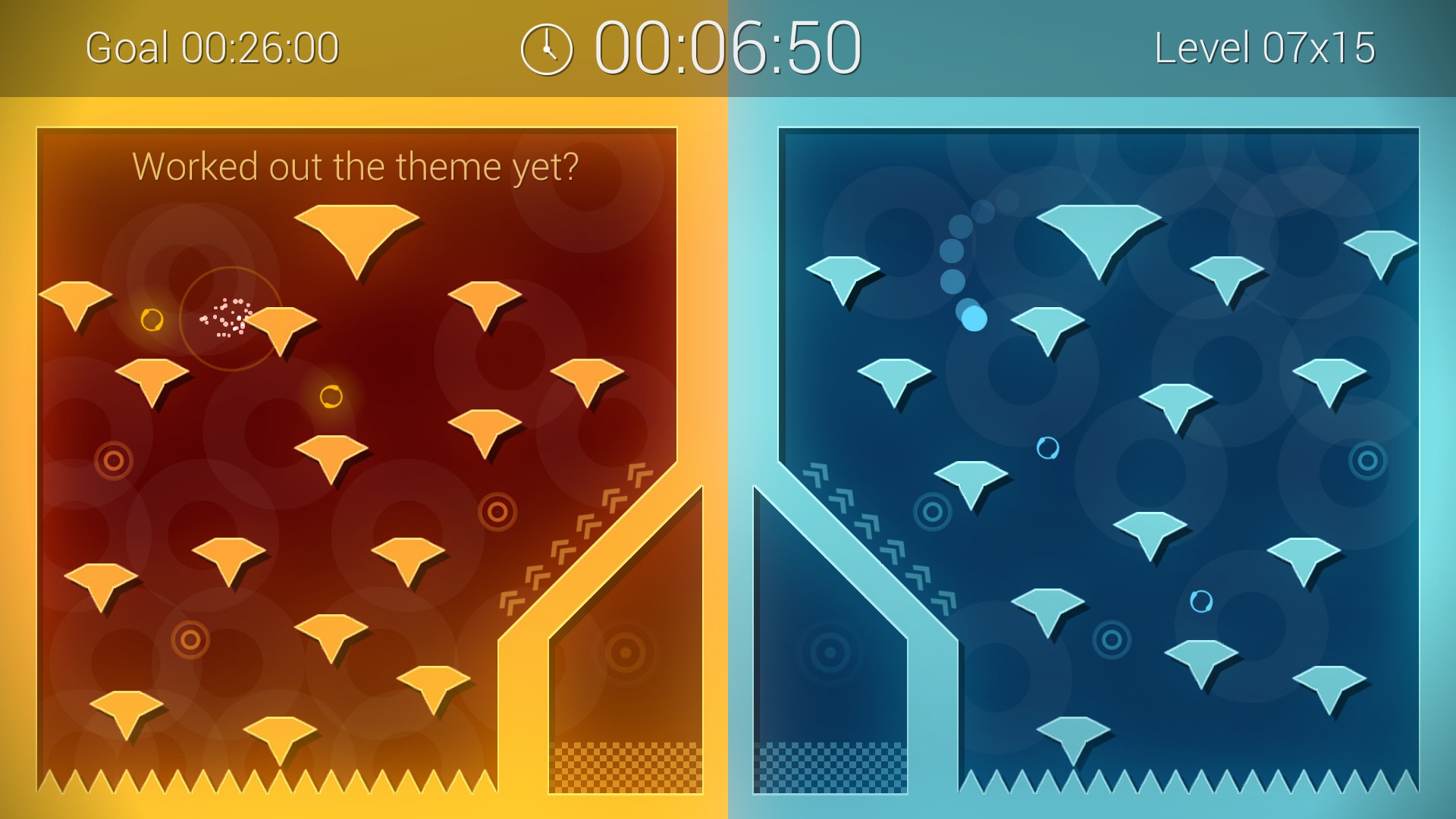One thing that’s great about the popularity of indie games is that it gives developers opportunities to experiment with unique concepts that larger studios may shy away from. Take for example a game like ‘VVVVVV’ where instead of having a tradition jumping mechanic you get to control the direction of gravity, or ‘Sound Shapes’ where you play a platform game with stages that react to the rhythm of the background music. Concept games such as these which focus around one unique mechanic are certainly interesting, but that doesn’t always necessarily mean they are good. Fortunately for me, this week I got to review a charming little game that is not only pretty unique as far as gameplay goes, but is also a hell of a lot of fun.
‘Binaries’ is a platform puzzle game with a twist. You control two balls which act in the same way any platform game character would. You run (well, roll) with the D-pad / analogue stick and jump with the X button. Each stage consists of a single static screen and it’s your job to navigate each ball to a designated goal while avoiding stage hazards. That’s literally it. The premise is simple enough and on paper sounds rather boring, however the twist is that you are forced to control both balls simultaneously using the same control inputs. With this one mechanic alone, this otherwise basic platformer becomes an engrossing puzzle game that requires logic, skill and a hefty amount of concentration.
The two balls are colour coded blue and orange. The blue ball can be only be destroyed by blue hazards (such as spikes or bullets), and in turn the orange ball is only vulnerable to orange hazards. As a result it’s possible to travel harmlessly across spikes, providing they are of the opposite colour. Each stage will have two colour coded goals which each ball has to reach. Get both balls in their respective goals simultaneously and you’ve successfully beaten the stage, however if either ball takes damage then the stage resets.
Similar to ‘Portal’, you will eventually begin to rethink the way you play and adopt some new techniques. For example, to maneuver through an obstacle you may wish to change the distance between the balls by deliberately rolling one into a wall to keep it stationary while the other can roll closer towards it. Or if you are in a corridor being shot at by orange bullets you can position the blue ball in front of the orange to absorb the shots and act as a human shield.
There are about 100 stages in total, most of which are mercilessly difficult and will require several attempts in order to beat. The difficulty is reminiscent of Super Meat Boy where you’ll likely die multiple times but when you do you can have another go immediately which deflates some of the frustration. Fortunately you only need to beat each stage once to progress, so with enough practice, a little perseverance and a decent mussel memory you should reach the goal eventually.
‘Binaries’ has no plot and strangely enough no overarching objective. The way the game is structured is with a main world map which is essentially a hexagon grid. Initially only one puzzle will be available (a simple tutorial), and as you beat each one the surrounding puzzles will unlock. The more puzzles you beat, the more become available to try. Should you be skilled enough to beat them all, you can replay unlocked stages at any time if you wish to improve your time and score a higher rank.
The graphics are deliberately minimalistic and consist of solid shapes in shades of blue and orange. Any detail is kept to a minimum but for a game like this it’s all you need. Given that this game requires a lot of concentration, this simple colour scheme is actually very helpful. There are some alternative visual styles available in the options menu, although personally I wasn’t keen on any of them. You can set the game to grayscale which makes it impossible to distinguish which colour is which, ‘pixel’ which is essentially just an ugly mosaic filter, and ‘chrome’ which frankly just hurt my eyes. The soundtrack consists of a handful of synthesized background tracks which suite the game’s style, although you’ll likely be focusing so much on the puzzles that you’d not even notice them.
Although ‘Binaries’ has no plot you can find little notes and comments plastered around the stages, including messages from the developer. These really add to the charm of this title and many of them helped raise a smile. Little comments like ‘I’m impressed, I didn’t expect anyone to get this far’, or ‘It’s a video game, but is it art’ amused me and contributed to this game’s personality.
There were a couple of tiny technical problems but nothing I’d let spoil my experience. There was one occasion where the over world map glitched out on me and I had to resort to restating the program. Also there is a horrible lag issue which occurs for a split second when one piece of music finishes and the next one is loading. It only occurs for a split second periodically, but since these puzzles require such sensitive precision, this is definitely a problem I’d like to see patched out.
Overall I was thoroughly impressed with ‘Binaries’. It’s a challenging and addictive puzzle game which is simple to understand and difficult to master. I can see myself playing it long after this review and have already recommended it to friends. It’s also worth noting that this is the first major release by ‘Ant Workshop Ltd’ and given what a fantastic debut this is, I reckon they’ll be worth keeping an eye on in future.
REVIEW CODE: A complimentary Sony Playstation 4 code was provided to Bonus Stage for this review. Please send all review code enquiries to press@4gn.co.uk.
Subscribe to our mailing list
Get the latest game reviews, news, features, and more straight to your inbox
Thank you for subscribing to Bonus Stage.
Something went wrong.
-
Gameplay - /10
0/10
-
Graphics - /10
0/10
-
Sound - /10
0/10
-
Replay Value - /10
0/10









